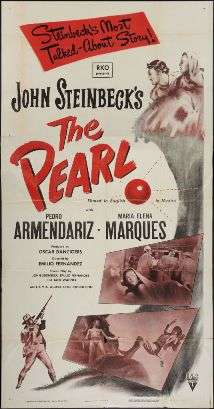The Pearl (film)
| La perla | |
|---|---|
 Theatrical release poster | |
| Directed by | Emilio Fernández |
| Produced by | Óscar Dancigers |
| Screenplay by |
John Steinbeck Emilio Fernández Jack Wagner |
| Based on |
The Pearl by John Steinbeck |
| Starring |
Pedro Armendáriz María Elena Marqués Fernando Wagner Charles Rooner |
| Music by | Antonio Díaz Conde |
| Cinematography | Gabriel Figueroa |
| Edited by | Gloria Schoemann |
Production company | |
| Distributed by |
RKO Radio Pictures Películas Mexicanas (Peli-Mex) |
Release dates |
|
Running time | 85 minutes |
| Country |
Mexico United States |
| Language |
2 versions: Spanish English |
La perla (The Pearl) is a 1947 Mexican/American film by the acclaimed director Emilio Fernández. The story is based on the novella The Pearl by John Steinbeck, who also co-wrote the screenplay for the movie.
In 2002, the film was selected for preservation in the United States National Film Registry by the Library of Congress as being "culturally, historically, or aesthetically significant".
Plot summary
In a fishing village, Kino (Armendáriz) and his wife Juana (Marqués) are in anguish because their little son Coyotito was stung by a scorpion, the local doctor (a foreigner) refuses to treat the child and the boy is taken to a curandera. Later the doctor and his brother (Wagner), a loan shark meet Kino again, after he finds an expensive pearl and decide to steal it from him.
Cast
- Pedro Armendáriz as Kino
- María Elena Marqués as Juana
- Fernando Wagner as Dealer 1
- Gilberto Gonzálezas Aid 1
- Charles Rooner as Doctor
- Juan García as Aid 2
- Alfonso Bedoya as Godfather
- Raúl Lechuga as Dealer 2
- Max Langler as Peasant
Reception
Critical response
When the film was originally released, Bosley Crowther, film critic for The New York Times, liked the film, writing, "An exceptional motion picture, both in content and genesis, is the beautiful and disturbing filmization of John Steinbeck's novelette, The Pearl, which reached an appropriate showcase at the Sutton Theatre yesterday. Exceptional it is in genesis by virtue of the fact that it was made in Mexico by a Mexican company with Mexican actors who speak English throughout. And extraordinary it is in content through the benefit of a story of primitive power, told with immaculate integrity through an eloquent camera."[1]
More recently, film critic Dennis Schwartz gave the film a mixed review and wrote, "Though the film is clumsy in its characterizations, the shimmering gorgeous black-and-white photography by cinematographer Gabriel Figueroa makes the film seem potent."[2]
Accolades
Venice Film Festival - 1947
Premio Ariel - 1948
|
Golden Globe - 1949
Madrid Film Festival - 1949
|
References
- ↑ Crother, Bosley. The New York Times, film review, February 18, 1948. Accessed: June 29, 2013.
- ↑ Schwartz, Dennis. Ozus' World Movie Reviews, May 18, 2005. Accessed: June 29, 2013.
External links
- The Pearl at the American Film Institute Catalog
- La Perla at the Internet Movie Database
- La Perla at AllMovie
- La Perla at the Cinema of Mexico site of ITESM (Spanish)
- La perla at Red escolar (Spanish)
- La perla informational site at Classic Film Guide
- La perla film scene on YouTube